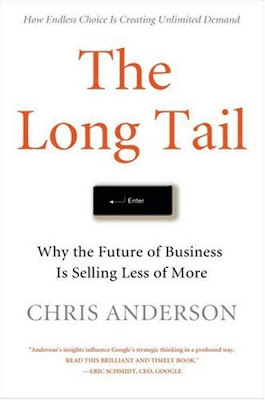
Maybe 2006 was a blur to me. Maybe it was the year that books by writers from Wired magazine didn't seem to matter much. Almost self-proclaimed futurist Chris Anderson pontificates in perfect Generation X prose a single idea over and over again. To extrapolate a feature article from Wired; well to be generous it could have been a book chapter, into a whole book is not an art form.
In an idea he shares, would Anderson have spent so much time watching reruns of Gilligan's Island if there was something better to do? Probably not.
He offers us a the salvation of giving us an insight into the life since 2000. Now, this could be of great use to my Grandfather who thinks of Bob Newhart as a young guy. But really, Anderson is preaching to the choir.
But . . . ok maybe this book is for middle age men looking at the new media and scratching their heads.
This book provides full descriptions in e-commerce sites such as google, netflicks, amazon, itunes, etc, and how they work.
He makes the point that when people have more options they are not going to be sitting around watching TV. He punctuates these points with interesting factoids, such as that a top TV show now would not make the the top 10 shows in the seventies, because less of the population is watching TV.
I can relate. My TV watching declined significantly when I moved to New York City where there are a thousands better things to do than watch TV. A case in point I can watch John Oliver on the Daily Show or I can go we him perform live at Comix on 14th street.
Actually, speaking of the Daily Show, Anderson tells us that more people watch it on-line than see it on TV. Still, he goes further. He predicts that formats of shows will change as people see TV content on the web or through Tivo. He has a point with Handheld devices , such as, the iphone, who wants to sit through a scheduled half hour of TV to see the one good Simpson joke. He makes this analogous to buying individual tracks of an album on itunes instead of buying the whole CD for one song. Why should I spend $10 on the last U2 CD when the only good song is Vertigo. This is liberation!
Google (+it's services like utube), itunes, amazon are making fortunes by giving people exactly what they want and for a lot less money and time. Now I have more money and time to try out new music, for instance, often based on the sites suggestions with customer reviews to back it up. Far out ,if I may barrow the expression.
So what is happening here? How is it different than what has happened in the good ole days.
As Anderson quotes some dude, people are filled with general and specific (niche) interests. On-line stores have infinite self space, so now I can get that music of German groove and funk from 1967 to 1974 that I heard in Canada but couldn't find in one New York city record store. It's really good by the way.
So, why could I not find this music today. It's the same reason why there was a radio show called 'Name that tune.' Limited shelve space equates to limited choices. In the 1940's everyone knew the latest Benny Goodman hit. Today, I don't think I have heard a song that went to number one on the billboard chart since Outcast's "Hey Ya." And my german music would not have many buyers besides me, and Costco can only sell so many CDs so they stick to the hits. Maybe if I couldn't find my german music on line I would have bought "Fifty cent sings the Journey catalogue, 'Don't stop believing in the da Hood'" Ok, sadly that isn't a real CD.
So, what is happening with the virtual store front, such as Amazon and itunes, is that people will be able to buy their niche interests. True, they only sell a few of those each, but aggregate that and the sales equal the sales of the hits. People generally flock to stores that selling everything than specialty stores, but on-lines are both. This is the long tail, in a standard deviation there is hump then lines goes off. It is where this line going off is where the money is.
Anderson gives us most of this is the first chapter and the rest of his goes over it again and again from slightly different directions.
No comments:
Post a Comment